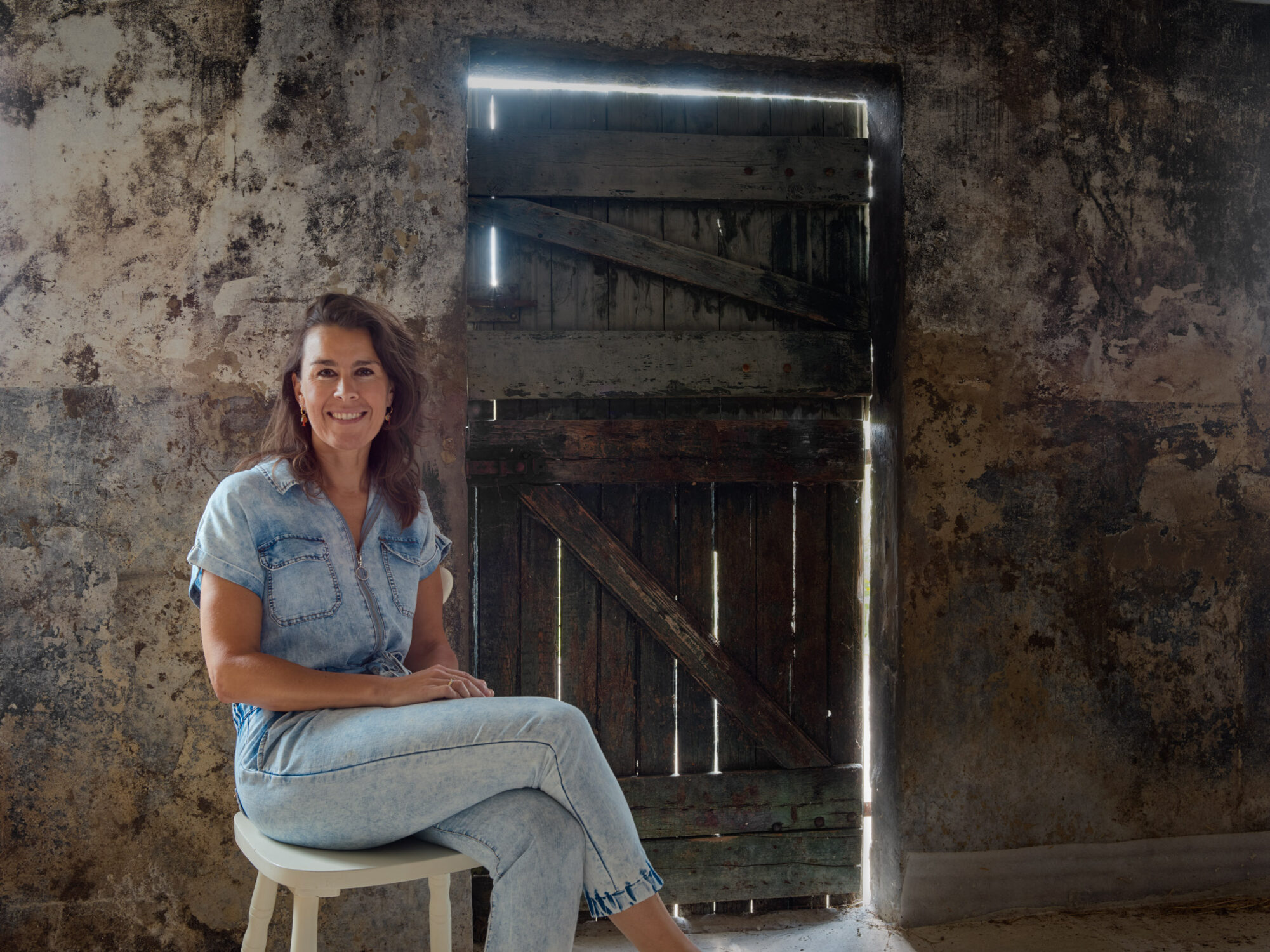"There are no better farmers than the organisms that live in the soil"
Eline Veninga
Chef de mission Lenteland
We’re at ’t Sierveld Farm to meet Eline Veninga, Lenteland’s Chef de mission. Eline (43) worked for the Albert Heijn and Jumbo supermarkets and was involved with Marqt, a chain of organic supermarkets in the major cities of the Netherlands. It brought her a wealth of experience, but her longing to be of social significance at a place where she can make an impact brought her to Lenteland, where she now supervises the seven Lenteland community farms and selects new Lenteland farms and farmers.
During coffee with traditional cherry flan (we are in Limburg after all), Eline starts telling us passionately about the mission of Lenteland, which is also her mission. ‘Regenerative agriculture is about far more than regenerating the soil. This kind of agriculture is for me an alternative to our current society, in which we are completely alienated from our food, how it’s produced and where it comes from. How can we get the community involved in the production of our food? How can we prevent farmland falling prey to land speculation? How can we contribute to public health? How can we prevent farmers slowly succumbing to loneliness? How can we give young people a chance to set up a farm?’
About Lenteland
The two main pillars of the Lenteland Foundation are regenerative agriculture and the idea of the ‘commons’: land shouldn’t belong to anyone, or rather it belongs to everyone. The foundation buys plots and then the key to them is put in the safe; since it’s never sold again, the land is taken out of the private – and often speculative – domain, remaining available for regenerative community farming.
By doing this the foundation gives access to land to future farmers, something many of them might not otherwise get.
The legal form of every local Lenteland farm is that of a cooperative. Together with Lenteland, the farmer forms the board of the cooperative, and many forms of membership and interaction can arise for and with financiers and the community.
As regards finance, the Lenteland Foundation makes buying a farm possible and provides money to the local cooperative in the form of a loan. Interested parties can then join the cooperative and become part owners. This means the farm becomes the property of the community step by step, and the Lenteland Foundation can make its money available again for the purchase of another farm. The partial ownership of the cooperatives is structured in such a way that mutual interest and the foundation’s mission are and remain paramount.
The Netherlands-wide Lenteland cooperative develops regenerative farms of which anyone can become a part-owner. The sale of certificates means that anyone can invest in one or more Lenteland farms simultaneously.
Source: Lenteland
After our coffee and flan we look for a place to record Eline’s story. It’s more than thirty degrees outside and it’s impossible to find a place in the shade. In the farm shop Jaap, a friend of Yves and Iris, is drilling and building, making an ingenious system for the veg boxes. In the old cowshed we find a place for Eline to tell her story.
We’re spending a day visiting ’t Sierveld Farm in Mechelen in the province of Limburg, a small village of 1500 inhabitants that’s part of the Gulpen-Wittem municipality, beautifully situated in the Gulpdal valley, surrounded by forests and meadows. It’s one of the seven Lenteland farms, and Yves and Iris are hard at work making a reality of their dream of running their own community farm. It’s an opportunity they owe to the Lenteland Foundation.
We wait for Yves and Iris, who are in the valley moving the cows to fresh pasture, an important part of the regenerative agriculture method. Their land is full of clover and a variety of nutritious grasses.
The farms have to fit within the mission of Lenteland: agriculture that is regenerative for the land and the community. An agriculture that restores both soil and community.
They don’t have very much time for us because there are vegetables to be harvested. Marieke got up particularly early to help harvest vegetables that are destined for the Hieros Gamos festival in Zeewolde this weekend. Jaap is busy in the farm shop, where his ingenious staging for the veg boxes is taking shape. Iris weighs and washes the vegetables.
At five o’clock there’s finally time to enjoy a beer together, although it’s far from the end of the working day. A lot still needs to be done.
Yves and Iris have chosen this life and it gives them great satisfaction. So they’re grateful to Lenteland for the opportunity they’ve been given to make this place a place of connection.
We have selected two more stories that might inspire you.
For the best viewing experience use landscape

To make your experience on our website even better, we use cookies!
